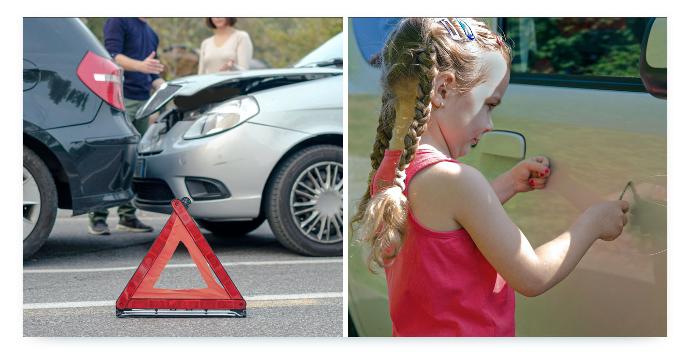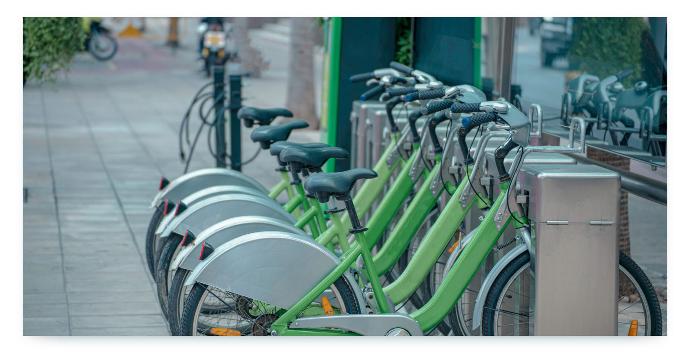Renting out vehicles is a business model that not only has meaningful and economic goals, but also comes with legal obligations and regulations. However, don't let this take away your joy - because the clearer you are about the legal basis and regulations, the more stable the foundation of your offer will be.
Please note that this article cannot replace legal advice or consultation on founding a company. We do not guarantee the timeliness and completeness of the content.
Which Legal Forms are Eligible
Shared mobility providers are organized in different legal forms - from large corporations to small and medium-sized partnerships and associations. In 2017, the majority of German carsharing providers with more than 25 vehicles were organized as limited liability companies (GmbH), while around half of the providers with fewer than 25 vehicles were organized as registered associations (source: Bundesverband CarSharing, 2018).
However, you have to weigh up which legal form is right for you on the basis of all the relevant factors. These include capital requirements, formation expenses, liability issues, as well as tax and financial statement regulations. Before you form your organization, seek the advice of a lawyer or tax advisor.
Please note:
The following information is based on German law regulation. There might be deviations in your country.
Registered cooperative
A cooperative is an association of natural persons or legal entities whose joint business operations serve the economic or social promotion of its members. A special feature of cooperatives is the three-way relationship in which co-owners are both business partners, i.e. customers or suppliers, and equity providers.

Non-profit image (especially for energy cooperatives)

Regular inspection costs by cooperative association
Civil law partnership
A civil law partnership is a simple form of partnership. It can be founded by at least two natural persons or legal entities. Many providers use this legal form only for the transitional period until they have saved up the minimum capital for a limited liability company, for example.

Low start-up costs and no financial contribution required

Shareholders are jointly and severally liable, even with their private assets
Limited liability company
A limited liability company is a corporation. To establish it, a share capital of 25,000 euros is required. This legal form is particularly suitable for larger or fast-growing shared mobility providers.

The liability of the shareholders is limited to the company's assets

Relatively high foundation costs
Entrepreneurial company
The entrepreneurial company is a special form of a limited liability corporation. A lower share capital of at least 1 euro is required for the foundation. Subsequently, there is an obligation to save up capital: as soon as a share capital of 25,000 euros has been accumulated, you can easily convert into a limited liability company.

Limitation of liability with a lower starting capital than for a limited liability company

Too little share capital increases the risk of insolvency
Stock corporation
Shared mobility providers operating as stock corporations are rarely listed on the stock exchange. Instead, the shares are distributed among customers and employees. As is usual with a stock corporation, the shareholders have voting rights at the shareholders' meetings. A stock corporation is generally only an option for large providers with very high capital requirements.

High creditworthiness

High foundation costs
Association
Even if associations for purposes such as carsharing & Co. are generally no longer recognized as charitable, idealistic goals such as environmental protection, the commitment to the traffic turnaround and the common good are still obviously in the foreground. Profits generated serve the growth of the association or the realization of the set goals. In order to found a registered association with legal capacity, at least seven people are required, as well as a set of articles of association. These articles also define the purpose of the association, which must not be primarily of a commercial nature.

Uncomplicated and inexpensive foundation; liability for debts limited to the association's assets

Low creditworthiness towards banks
Important Insurances for Carsharing & Co.
You should assign a high priority to the item "Insurances" on the roadmap to your shared mobility offer. Some insurances are required by law (in Germany), others are at least recommended. This is how you protect yourself as a provider against sometimes high claims for damages.
We list the most relevant insurances, especially in carsharing operations, below. Please note that the timeliness and completeness of the information is not guaranteed. Also, check carefully which insurances are common or even mandatory in your country.

Motor vehicle liability insurance
This insurance covers damage caused by the car to third parties. In Germany, car insurance is mandatory by law for every car owner. For carsharing operations, the insurer must be informed about and expressly permit the lending of the vehicle to certain or any persons.
A minimum insurance sum of 7.5 million euros is prescribed - but a significantly higher sum (50 - 100 million euros) is recommended. After all, in the event of a claim, the claims quickly exceed the stated sum and you as the provider must then pay for the rest.
Attention: As a rule, damage due to force majeure is excluded from the motor vehicle liability insurance.
What applies to other types of vehicles?
The insurance obligation also applies to motorized scooters, for which you must renew the issued insurance license plate once a year.
In the case of bicycles, on the other hand, the riders are regularly liable via their private liability insurance or alternatively with their private assets.
If it can be proven that a defect in the bicycle causes damage to a third party, this usually affects your company liability insurance.
Partial/comprehensive insurance
You protect the integrity of your own vehicle through so-called comprehensive insurances. These cover damage, destruction or loss of the car, even in the event of storms or other cases of force majeure.
Partial cover insurance only insures against direct theft and severe weather. In the event of an insured loss, it pays for the repair or replaces the current value. Comprehensive insurance, on the other hand, also pays out in the event of own fault, hit-and-run accidents or vandalism by third parties. Comprehensive insurance is particularly recommended for newer vehicles (fully comprehensive: max. 4 years, partially comprehensive: max. 8 years).
The rather high insurance premium can be reduced by a fixed deductible.
What applies to micro mobility?
Further insurance
You should clarify individually whether accident insurance is also useful in your case. It is also conceivable that leasing companies or financing banks may have additional requirements for insuring a vehicle. If you want to allow your users to travel abroad, you may also want to consider international insurance.
All insurance premiums depend on factors such as the vehicle model, the parking space, the number of users and the annual mileage. The location also influences the premium. For example, insurance is usually more expensive in large cities than in rural areas.
Note
Always communicate insurance conditions transparently to your drivers. Especially if they include a possible deductible in the event of damage.
Age Limits in Sharing Operations
The decisive factor for age limits is first of all the minimum age prescribed by law for driving a certain type of vehicle. In Germany, for example, you have to be at least 18 years old to drive a passenger car alone.
For micromobility such as bike sharing, there is initially no age limit based on a legally regulated driver's license. However, since persons under the age of 18 are considered to have limited legal capacity, at least in Germany, they are not allowed to enter into contracts without the consent of their parents or legal guardians. This also applies to rental contracts - which is why here in Germany the minimum age in shared mobility is 18, irrespective of a driver's license.
In addition, insurers or providers, among others, may also set higher minimum ages at their discretion.
Register Sharing Cars and Scooters
As the vehicle owner, you register carsharing vehicles as well as sit-on scooters at the vehicle registration office of your traffic department. In doing so, you must always classify them as commercially used vehicles and inform the office that they are sharing vehicles.
The exact classification of the vehicles is ultimately at the discretion of the respective registration office. In principle, however, commercial, public shared mobility services are classified as self-driving rental vehicles and therefore require an annual general inspection. In contrast, this only takes place every two years for private vehicles. However, not every insurance company accepts self-driving rental vehicles, so you may be somewhat limited in your choice of insurance provider.
Knowledge for Take Away
Our guide will help you stay on top of things as you build your sharing offering. Learn what matters and what you should think about.
Your Duties as a Vehicle Owner
As the owner or lessee of a passenger car, you are legally the vehicle owner, which entails various obligations. You should get an overview of these at the beginning of your offer development in order to take legal requirements into account during the planning phase. Here you will find a selection of the obligations as a vehicle owner in Germany:

Driver's license verification for the respective vehicle classes and models.
Note that written documentation of the exam is required. The test can also take place digitally via third-party providers.

Compliance with accident prevention regulations.
An inspection of the compliance with accident prevention regulations regarding the vehicle and equipment (first aid kit, warning triangle, high-visibility vests, etc.) must be carried out annually by an authorized workshop. In addition, all employees must be instructed in the respective regulations.

Proper tires.
Observe the minimum tread depth. Winter tires are not everywhere mandatory. However, if accidents or traffic obstructions occur due to insufficient tires for the weather conditions, you may be held liable.

Frost protection.
There must be sufficient antifreeze in the windshield washer system. In addition, the windshield wipers must have functional wiper blades.

Duty to cooperate.
You have a duty to cooperate in the investigation of drivers who have committed an offense requiring registration or even a criminal offense with your vehicle. This also applies to violations abroad.
Local Regulations
As a provider, you are always subject to the local laws and regulations at your location. Even though municipalities are generally willing to promote shared mobility offerings because they also help to reduce traffic congestion, it is also incumbent on them to take into account the interests of all local people and organizations equally.
In the recent past, carelessly parked or overturned bicycles and kick scooters have made negative headlines. Particularly in large cities and metropolitan regions where there is already a high level of shared mobility provision, license models or special permits are therefore being introduced in isolated cases. These specify, for example, the number of vehicles allowed per provider or impose parking bans in individual areas. This primarily affects free-floating micro mobility offerings, i.e., bicycles and scooters. These regulations are intended to ensure that vehicles do not block sidewalks, green spaces, etc. and thus cause displeasure among the general population.

For you as a provider: Inform yourself well about applicable and planned local laws. These regulations often regulate not only the vehicles per provider, but also the providers themselves. These must then prove to the city that they are the better choice and market their offer in tenders (or in other processes, depending on the municipality). The quality and concept of the offer are decisive here.
So strive for a cooperative relationship with your city or local government. Politicians and providers often pursue similar goals and should be pulling in the same direction. With political support, you can establish your offering locally and possibly increase your visibility and image as a reputable provider.
Consumer Protection, Data Privacy and T&C
Furthermore, like any business, you are required to comply with consumer and data protection laws.
In addition, you are subject to your country's data protection regulations. After all, you regularly come into contact with sensitive data (personal contact data, driver's license numbers, payment data...) as part of your sharing operation. In the European Union, the General Data Protection Regulation (GDPR) regulates the handling of personal data. Check which regulations you have to take into account at your location. If necessary, it is advisable to appoint an internal or external data protection officer (if this is not required by law anyway).
What are the Benefits of a Membership in Associations?
Associations basically offer the advantage that they represent the common interests of their members vis-à-vis politicians. Thus, associations usually have a louder voice that is more likely to be heard than that of individual companies or organizations. In addition, membership can increase trust among potential user groups or partners and convey a serious impression.
The German Federal Association for Carsharing (bcs)
A major association for carsharing providers in Germany is the Bundesverband für Carsharing (bcs), which currently has 205 members (as of February 2021). In addition to the benefits mentioned above, members also benefit from discounts on certain vehicle purchases, fuel cards or insurance.
In addition, the bcs supports providers in contacts and cooperations with companies, public agencies or other providers. Internal as well as external events are regularly organized for the exchange of experience and network building.
Another important aspect is the individual advice provided by the association on the establishment and further development of the company's own service. Inclusion in the association's own station map of carsharing providers in Germany ensures greater reach and better findability.

Make Yourself a Plan
No one is asking you to go through all of the above on your own. Call on experts and get advice - that way you have more certainty and can focus more on your own competencies.
And: The effort is worth it, because in this phase you are building the foundation for your business model, which makes the above tasks especially important. Once you have a stable and secure basis, you can develop freely in the further design of your offering.




